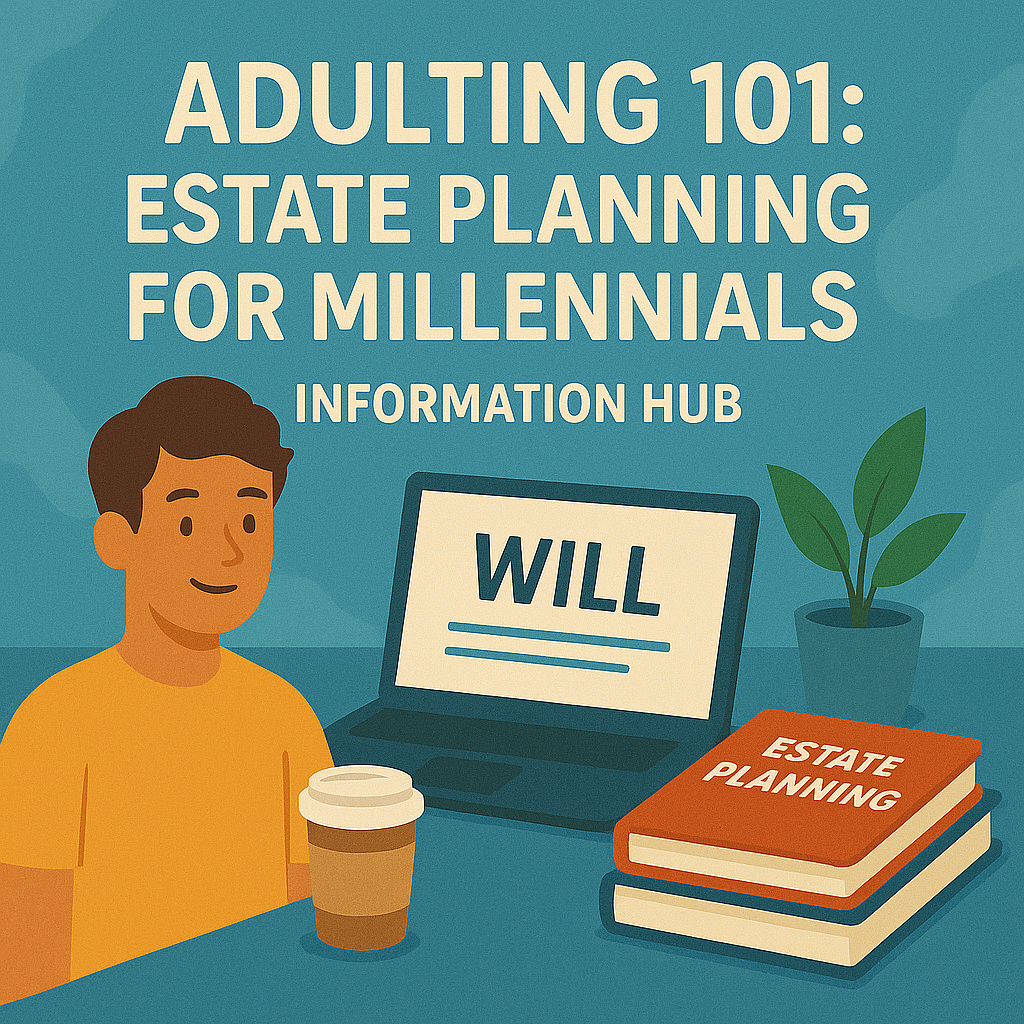Estate Planning for Millennials: A Guide for People Who Don’t Think They Need One
The Adulting 101: Estate Planning For Millennials Hub

Estate planning is the ultimate "get your shit together" exercise. It's about organizing your finances, healthcare wishes, and digital life so that everything works exactly the way you want it. And it's not just for the rich... everyone benefits from planning ahead. Create your estate plan today, plan for tomorrow, and let it evolve with you over time.
So, have you thought about these questions?
- What happens if you're in a medical emergency and no one knows what you want?
- Who gets access to your accounts, passwords, and investments if something happens to you?
- If you own a car, a dog, a savings account, or even a streaming subscription, who takes care of it?
A will, advance directives, and a few simple steps can ensure that your assets, digital life, and personal decisions are handled exactly as you want and not left to the courts or to relatives who might not know your true intentions. (The funny thing is, everyone already has an estate plan. If you die without a will, the government decides what happens to you and your stuff.)
This Information Hub will walk you through the essentials and help you take action with tools like the CLEAR Kit, Executor’s Summary Report, and our quick-start estate planning resources. Best of all, putting them together doesn't need to break the bank.
Table of Contents
Key Things To Know
Most millennials assume estate planning is something you do later. Spoiler alert: It’s something you should do now. Here’s why:
- You have an estate, even if you don’t own a house: Your bank accounts, Venmo, car, crypto, and even your Instagram account are part of your estate. If you don’t decide what happens to them, the state will. (That's called dying "intestate".)
- Wills aren’t just for parents or rich people: A will lets you choose who inherits your assets, who manages your accounts, and who takes care of your pet. No will? The government makes the call.
- Your digital life needs a plan: If no one knows how to access your bank accounts, social media, text messages, photos, or cloud storage, they could be locked, lost, or hacked.
- You need a medical plan, too: If you’re ever in an accident, a healthcare proxy and advance directives ensure someone you trust makes decisions for you.
- Estate planning doesn't need to be hard or expensive: You don’t need to hire a lawyer for basic estate planning. You can create a legally valid will and power of attorney online today.
Unsure where To Start? We got you...
Buried in Work provides a wide range of checklists, guides, and resources to help you navigate estate planning and end-of-life organization. Below are some of the key resources we believe will be most helpful. In addition, we offer more than 80 Information Hubs, a podcast, 100 checklists, 15 guides, and much more. If you do not find what you are looking for, feel free to contact us for additional support.
Life Changes and Estate Planning: Keeping Your Future on Track
Estate planning isn’t a one-and-done task. Life changes, and when it does, your estate plan should change with it. Major milestones like marriage, having a child, divorce, or even a significant health diagnosis can impact your financial and legal situation.
This section covers how to update your estate plan after key life events, ensuring your loved ones, finances, and wishes are properly accounted for. Whether you are organizing your estate for the first time or revising it after a major shift, staying proactive will save you and your family unnecessary stress down the road.
Parents & Caregiving
Many millennials and Gen Xers are part of the sandwich generation, balancing careers, raising children, and caring for aging parents all at the same time. Estate planning and caregiving responsibilities often fall on your shoulders, whether it is helping your parents get organized, discussing their long-term care wishes, or making sure their home is safe.
This section provides conversation guides, estate planning checklists, and home safety tips to help you support your parents while managing your own responsibilities. Taking small steps now can prevent stressful decisions later and ensure your family is prepared for whatever comes next.
What to Do When A Parent Dies
Losing a parent is one of life’s most difficult experiences. In the midst of grief, there are also immediate decisions to make and practical tasks to handle. From notifying family members and securing important documents to handling funeral arrangements and settling their estate, knowing what to do can feel overwhelming. It won't get better, but it will get easier.
Find A Service Provider Near You
Need professional assistance? Use our directories to find trusted service providers near you who specialize in estate planning, end-of-life organization, and related services.
Frequently Asked Questions
Estate planning is not just about what happens when you die. It is about making sure your finances, digital life, and medical decisions are handled the way you want if something happens to you. Whether you are figuring out how to create a will, set up a healthcare directive, or organize your passwords and accounts, having a plan makes life easier for you and your loved ones. Below are the most common questions millennials ask when getting started.
General Information
Digital and Financial Estate Planning
Healthcare and Family Considerations
Logistics of Creating an Estate Plan
Disclaimer: The information provided on this website and by Buried in Work is for general informational purposes only and should not be considered legal advice. Please consult with a qualified attorney or subject matter expert for advice specific to your situation.

